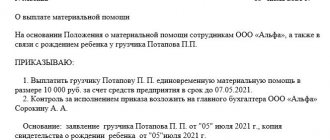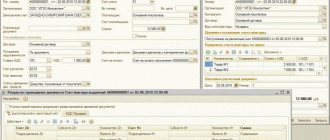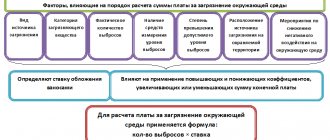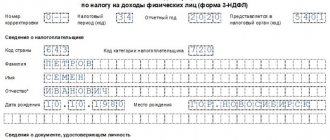In cases where the earned remuneration is not transferred to the employee’s bank card in a non-cash manner, but is issued at the cash desk, situations may always arise when the money is ready to be issued, but the person was unable to show up for it at the appointed time. The reasons may be different: absence due to illness, due to a business trip or due to other circumstances. What should a cashier or accountant do in such cases?
The legislation for this purpose provides for a procedure for depositing wages. Let's talk about how it should be carried out.
When, using the accrual method, should accounts payable for deposited wages be taken into account in income (clause 18 of article 250 and clause 1 of article 271 of the Tax Code of the Russian Federation)?
What is the point of depositing?
According to the law, the employer can choose the method of paying remuneration earned by employees:
- non-cash payments that do not require the personal presence of employees,
- cash payment according to the statement.
In the latter case, it is assumed that this occurs at the place of work, and non-working hours of the staff will not be spent on travel in order to receive the finances they deserve.
If the worker did not have time to go to the cashier, personally sign the statement and collect his money at the appointed time, and did not instruct anyone to do this in his place, the unissued salary must be deposited.
Depositing is an accounting reflection in the primary accounting documentation of salary amounts as not issued to the employee.
Deadlines for deposit
If the salary is issued in cache, this must be reflected in special unified document forms approved by Decree of the State Statistics Committee of Russia dated January 5, 2004 No. 1:
- payroll - T-53;
- payroll - T-49.
The first page of this document must include the date when it was generated and the salary was issued. The period that can be kept in the company’s cash register, and therefore the time for employees to receive them, is limited by the source of finance intended for the payment of labor remuneration:
- the money has been received from the bank - from the date of receipt, including this day, the funds can be kept in the cash register for no longer than 5 days, then they will have to be returned back to the bank;
- cash from the proceeds is used as salary - this money remains a financial cash limit, therefore it must be withdrawn at the end of the working day if the amount is greater than the allowed cash balance; In this case, the salary must be paid during the current day.
If the established time has elapsed and the employee does not show up to collect his money, the accountant will deposit it and the statement will be closed.
How to write off arrears of deposited wages with an expired statute of limitations?
How are deposited wages written off?
In accordance with clause 6.5 of the Procedure for conducting cash transactions [1], wages, scholarships, and benefits not received on time must be deposited.
By virtue of this rule, on the last day of issuing cash intended for paying wages and making other payments, the cashier in the payroll sheet (payroll) puts a seal (stamp) or makes the entry “Deposited” opposite the names and initials of the employees who no cash issued. He calculates and records in the final line the amount of cash actually issued and the amount to be deposited, checks the indicated amounts with the total amount in the payroll (payroll), puts his signature on the payroll (payroll) and transfers it to signing by the chief accountant or accountant (in their absence, by the manager). An expense cash order is issued for the actual amounts of cash issued.
According to clause 270 of Instruction No. 157n[2], deposited wages are reflected using account 304 02 “Settlements with depositors”. Thus, accounts payable for employees available on account 302 11 “Payroll calculations” should not exceed the monthly debt incurred during the last month of the current financial year. The excess amounts must be reflected in the depositor account, that is, in account 304 02 “Settlements with depositors.”
How long to take into account unearned wages in account 304 02 is determined by the institution based on the results of the annual inventory. Let us recall that in accordance with paragraph 371 of Instruction No. 157n, the debt of an institution that is not claimed by the creditor is accepted for off-balance sheet accounting for monitoring during the limitation period in the amount of debt written off from the balance sheet. Let us recall that to account for such debt, off-balance sheet account 20 “Debt not claimed by creditors” is used.
The write-off of the amount of accounts payable not claimed by creditors is reflected in the credit of account 0 401 10 173 “Extraordinary income from transactions with assets” (with the simultaneous reflection of the written-off amount on off-balance sheet account 20).
Based on the results of an inventory of settlements carried out in a budgetary institution, it was revealed that the accounts payable, which was not real for payment, was listed on the deposit account of O.I. Petrova in the amount of 2,273 rubles. by type of financial support code 2 “Income-generating activities”. According to the order of the head of the institution, this debt was written off to the income of the institution.
In accordance with Instruction No. 174n[3], the following entries will be made in accounting:
| Contents of operation | Debit | Credit | Amount, rub. |
| The institution's debt to the creditor has been written off | 2 304 02 830 | 2 401 10 173 | 2 273 |
| At the same time, accounts payable are taken into account off the balance sheet* | Off-balance sheet account 20 | 2 273 | |
| The account was closed (at the end of the year) | 2 401 10 173 | 2 401 30 000 | 2 273 |
Analytical accounting for off-balance sheet account 20 is organized in the context of the types of payments for which the institution’s debt to creditors was taken into account on the institution’s balance sheet, indicating the full name of the creditor and other details (clause 372 of Instruction No. 157n).
Further, as noted, the debt of the institution, not claimed by the creditor, is accepted for off-balance sheet accounting for monitoring during the limitation period. Thus, the institution has the right to write off deposited wages from off-balance sheet accounting when the statute of limitations expires.
Let us remind you that the limitation period is the period for protecting the right under the claim of a person whose right has been violated. The general limitation period is three years from the date determined in accordance with Art. 200 of the Civil Code of the Russian Federation (clause 1 of Article 196 of the Civil Code of the Russian Federation). At the same time, for certain types of claims, the law may establish special limitation periods, shorter or longer than the general period (clause 1 of Article 197 of the Civil Code of the Russian Federation).
As noted in the letters of the Ministry of Finance of the Russian Federation dated March 22, 2010 No. 03-03-06/1/161, the Federal Tax Service of the Russian Federation dated October 6, 2009 No. 3-2-06/109, the statute of limitations for arrears of deposited wages is three years. It is after this period that the employer has the right to write off the amounts of unclaimed accounts payable.
In accordance with paragraph 371 of Instruction No. 157n, writing off an institution’s debt that is not claimed by creditors from off-balance sheet accounting is carried out on the basis of a decision of the commission (inventory commission) of the institution in the manner established by the institution’s act as part of the formation of accounting policies.
If an institution registers a monetary obligation at the request of a creditor in the manner prescribed by the legislation of the Russian Federation, the institution’s debt, not claimed by creditors, is subject to write-off from off-balance sheet accounting and reflected on the corresponding analytical balance sheet accounts of liabilities (clause 371 of Instruction No. 157n).
Based on the results of an inventory carried out in a budgetary institution, unclaimed payables for wages in the amount of 2,273 rubles were identified on off-balance sheet account 20, the statute of limitations for which had expired. Based on the manager’s order, this debt was written off from the account.
According to Instruction No. 174n, the following entry will be made in accounting:
| Contents of operation | Debit | Credit | Amount, rub. |
| The institution's debt to the creditor has been written off after the statute of limitations has expired | Off-balance sheet account 20 | 2 273 |
[1] The procedure for conducting cash transactions by legal entities and the simplified procedure for conducting cash transactions by individual entrepreneurs and small businesses, approved. Directive of the Central Bank of the Russian Federation dated March 11, 2014 No. 3210-U.
[2] Instructions for the application of the Unified Chart of Accounts for public authorities (state bodies), local governments, management bodies of state extra-budgetary funds, state academies of sciences, state (municipal) institutions, approved. By Order of the Ministry of Finance of the Russian Federation dated December 1, 2010 No. 157n.
[3] Instructions for the use of the Chart of Accounts for accounting of budgetary institutions, approved. By Order of the Ministry of Finance of the Russian Federation dated December 16, 2010 No. 174n.
Hello Guest! Offer from "Clerk"
Online professional retraining “Accountant on the simplified tax system” with a diploma for 250 academic hours . Learn everything new to avoid mistakes. Online training for 2 months, the stream starts on March 1.
Sign up
Actions of the accountant (cashier) during deposit
After the time allotted for paying wages has expired, the accountant must carry out sequential actions regulated by the Procedure for Conducting Cash Transactions (clause 18 talks about depositing).
- To confirm the receipt of money by employees, the corresponding columns are provided in the statements: 23 – “Received money” in the payroll and 5 – “Signature on receipt of money” in the settlement and payment slip. If, after the allowed time has elapsed after opening the statement, no employee signatures appear in these columns, the accountant applies a special stamp or writes “Deposited” in them.
- At the bottom of the statements, they are indicated separately and the issued and deposited salaries are calculated; they must coincide with the total, which is what the cashier (accountant) signs on the statement.
- The numbers of deposited salaries are entered into a special register (the form is not approved by law; an enterprise can develop it independently and record it in internal documentation).
- For sums of money issued as wages, it is required to draw up an expense cash order (form No. KO-2, approved by Decree of the State Statistics Committee of Russia dated August 18, 1998 No. 88), its details are also noted on the statement and entered into the cash book.
- All records previously certified by the signature of the accountant (cashier) must be transferred for control to the chief accountant or management.
- The cashier is obliged to hand over money not given to employees to the bank, since it is prohibited to keep amounts in the cash register that exceed the permitted limits, even if they are intended for future expenses.
IMPORTANT! If the funds were issued not by the cashier, but by another person on his behalf, then at the bottom of the document an additional mark is required about who issued the money according to this statement.
How to arrange the release of deposited wages from the cash desk by proxy ?
What to do if no one comes to collect your salary?
As we mentioned above, if the employee or his authorized representative does not show up to collect the wages with a receipt, the wages are deposited after a few days. Based on the legislation of the Russian Federation, the accountant is obliged to return funds to the company’s bank account within the prescribed period.
A one-time payment from the funded part of the pension - find out how to get it in our expert material. You can learn about the correct registration of a pension here.
Read all the details about raising the retirement age in this article.
Accounting entries for deposited salaries
It doesn’t matter when exactly the staff representative should have received it in his hands and did not receive his “hard-earned money”, accounting for the salary should concern the month when it was accrued, as stated in paragraph 5 of PBU 1/2008. Accounting procedures are divided into three parts: accrual, deposit and payment of deposited salary.
Payroll payments:
- debit 20 (23, 25, 26, 29, 44), credit 70 – “Salaries accrued”;
- debit 70, credit 68, subaccount “Calculations for personal income tax” - “Personal income tax is withheld from the amount of wages”;
- debit 70, credit 50 (51) - “Salaries paid minus the amount of personal income tax.”
Deposit of salary amounts is carried out in the subaccount “Settlements on deposited amounts”, which is part of account 76 “Settlements with various debtors and creditors”:
- debit 70, credit 76 – “The amount of uncollected salary has been deposited”;
- debit 51, credit 50 - “The amount of deposited wages has been credited to the organization’s current account.”
Payment of deposited salary funds:
- debit 50, credit 51 – “Money was received from the bank for the issuance of deposited salaries”;
- debit 76, credit 50, subaccount “Calculations for deposited amounts” - “Deposited salary issued to employee.”
Question: What is the period for withholding and paying personal income tax on wages deposited by the employer? View answer
Documents used in accounting for deposited amounts
Accounting for transactions is carried out using documentary forms of a standard unified sample. A number of documents, such as cash orders, statements, and cash books, are not developed independently.
| Document | Description |
| Payroll records | Settlement and payment form No. T-49 and payment form No. T-53 are used |
| Account cash warrant | RKO form No. KO-2 |
| Receipt cash order | PKO form No. KO-1 |
| Cash book | Form No. KO-4 is used |
Commercial enterprises develop their own register forms and books for recording deposited wages. Form OKUD 0504048 is often used as an accounting book, and registry form OKUD 0504047, established for budget document flow.
Escrow money, taxes and fees
If finances for salary are received from a bank , personal income tax from them is transferred immediately upon receipt, on the same date (paragraph 1, paragraph 6, article 226 of the Tax Code of the Russian Federation), even before the salary sheet is opened for paying money to staff.
Proceeds in cash for payment of earned money allow personal income tax to be withheld when the money is given to workers (clause 4 of Article 226 of the Tax Code of the Russian Federation), and tax payments can be made on the day following the salary.
Contributions to various social insurance funds must be made regardless of the days of payment of salaries: for this, a mandatory period is provided, not exceeding the middle of the month following the salary period (Part 5, Article 15 of the Federal Law of July 24, 2009 No. 212-FZ). Depositing your salary does not affect these deadlines in any way.
How to receive deposited money?
An employee who is overdue for receiving his salary must contact the cashier or the secretariat (the form of appeal should be written or oral, it is decided by the enterprise). The registered application is transferred to the chief accountant, who will take these funds into account as additional cash receipts.
In what cases will the deposited salary no longer be returned?
If funds not received for any reason are returned to the company’s account, the person who earned them may claim them for a fairly long, but not infinite, period of time.
The funds returned to the bank, which at one time represented wages, will simply turn into the organization’s profit and can no longer be paid at the request of the employee after the expiration of a three-year period (Article 196 of the Civil Code of the Russian Federation).
If this happens, then these funds will be included in the income item, which is how they are taken into account in accounting and taxation.
The accountant is asked to reflect this as follows: debit 76, credit 91-1, subaccount “Calculations for deposited amounts” - “Deposited wages written off upon expiration of the claim period.”
When required
The procedure for making financial settlements between an employer and an employee is regulated by the provisions of the Labor Code and the clauses of the agreement (individually with the employee or the team). Separate rules can be established by the company’s internal regulations, recorded in documents and orders.
Cash payments with payment through the company's cash desk are a method that is becoming a thing of the past, since it distracts from the work process and forces you to take additional actions. Most organizations in Russia have switched to non-cash payments. While there is still room for cash in settlements with the company, problems periodically arise with the transfer of money to an absent employee. In such cases, the cashier waits for a limited number of days for the employee to return, and the accounting department is forced to deposit the amount if the employee never shows up.
Deposited wages are funds accrued by the employer, but not paid within the allotted time to the employee. With the help of deposit, earnings do not disappear and are subject to accounting, and wage depositors will receive money either at the enterprise's cash desk or by contacting the accounting department when the period for issuing cash has passed.
When depositing, the accounting department reflects the unpaid money in primary accounting and accounting. An important nuance is to include deposited amounts in calculated taxes and contributions. It should be remembered that this method of accounting for the unpaid amount does not affect taxation, because the obligation arises upon accrual, and not upon issuance of funds or deposit.









